
“Natural Stone is the original green building material. ”
- Mark McCullough, This Old House2: Design your outdoor living spaces with Indiana Limestone
3. Bring the outdoors in
4: Indiana Limestone varieties and local quarries
5: Architectural applications where Indiana Limestone is used
6: How to install natural stone landscape elements
7: Frequently Asked Questions
8: What makes Indiana Limestone a sustainable building material
9. How to care for and maintain Indiana Limestone
Indiana Limestone is a calcite-cemented calcareous stone formed of shells and shell fragments in the belt region of Indiana. It was formed in a shallow sea that covered the Midwest more than 300 million years where a vast number of shell-protected organisms inhabited the waters. Shellfish like brachiopods and mollusks lived in this ancient sea and as the shells were shifted, broken, crushed and ground up by the action of the water’s currents it resulted in a finely divided calcium carbonate.
.png?width=800&name=Untitled%20design%20(10).png)
This adhered to many of the shells in a series of concentric layers to form oolitic (‘rock egg’) grains, named after its resemblance to fish roe. As these particles accumulated and were buried on the floor of the sea, they were transformed into solid rock through compaction, the interlocking of grains, and cementation. And voila - we have nature’s original green building material!
Selecting Indiana limestone for a project opens the door to creativity and enables you to leave your mark for centuries to come. It instantly transforms any structure from the ordinary to the extraordinary, showcasing your vision through the stunning aesthetics, longevity, durability, and workability of Indiana limestone.
 Beckford Tower, New York, NY
Beckford Tower, New York, NY
Despite the many options of designers, installers and owners, Indiana limestone continues to be a building stone of choice. Indiana limestone consistently outperforms man-made products in such areas as strength, durability and ageless beauty. This versatile stone equally provides stability and sustainability to fit your budget. Below are some of the benefits of Indiana limestone:
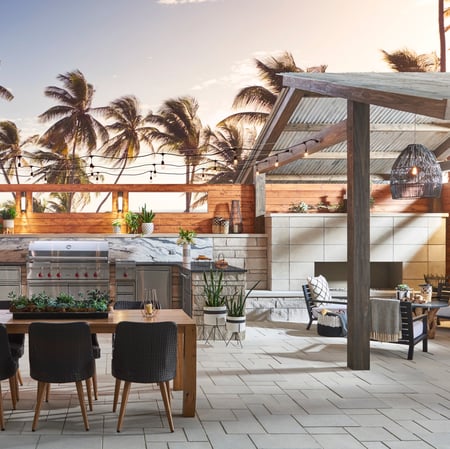
An outdoor living space should be an oasis – an escape from the grind of the real world made simple by walking into your backyard. Shouldn’t the material you use for your masterpiece make a statement? Natural stone will add a touch of reverent beauty to any landscaping dream you have. And there are few materials better suited for bringing your vision to life than Indiana Limestone. It's made by the earth and for the earth, right here on American soil. It's made for your enjoyment and to connect you with the natural surroundings you create in your outdoor living spaces.
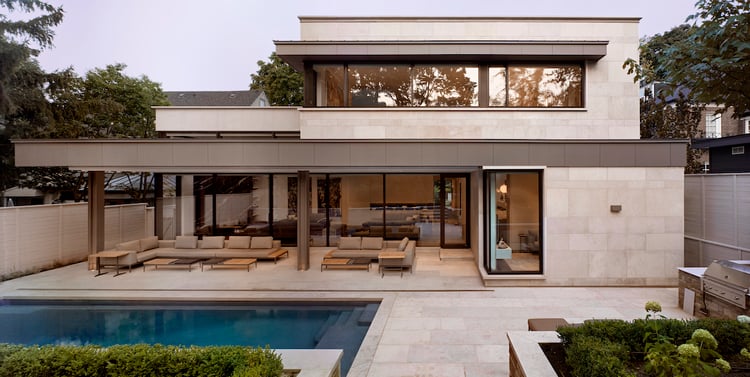
A modern home design can both fit in yet also stand out when reinterpreting Indiana Limestone detailing. Veneer slabs clad the exterior walls and base of the house, tying it into the local vernacular.
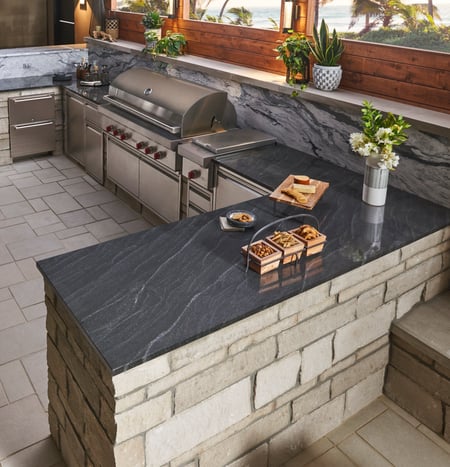
According to the National Kitchen & Bath Association 2021 Design Trends Research, there has been a 65% increase in overall interest in outdoor living projects, with outdoor kitchens ranked as the top project planned for 2022. Homeowners are seeking a balance of aesthetics and performance with an emphasis on a lifestyle without limits. To create these sanctuaries of solace it all comes down to this: people want all of the comforts of inside on the outside. People want spaces that swaddle them, their families, and friends from the chaos of the world.
Polycor's hardscapes and masonry products are 100 percent natural materials that are equally at home in a rustic modern design as they are in a contemporary urban rooftop. See how these historic stones can match any style from country chic to urban sleek.

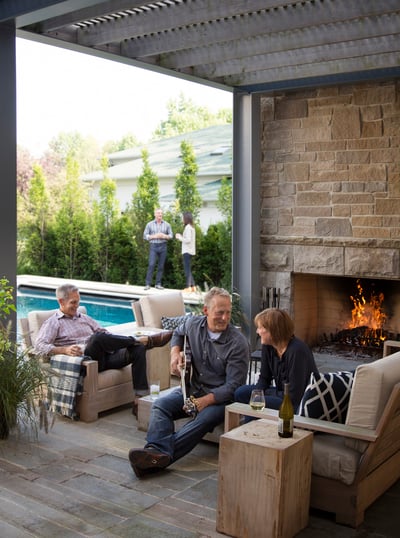
Open up your entertainment to the outdoors by opening your home to a beckoning stone oasis that lies just beyond your back door. Outside is definitely the new inside.
Cooking and entertaining guests are a big focus when deciding on the right outdoor design. How people interact and flow through these spaces, or zones, can dictate the design and material selections. Examples of trends that won’t go out of style anytime soon are seating arrangements that provide inviting spaces for small to large gatherings, fireplaces and heaters to extend the seasons, and creative lighting to extend the indoor experience, setting a mood for outdoor 'rooms'.
“The material has been around forever. There’s just something about a natural material versus engineered. A big word I like to use is authentic, it’s been there forever. If you choose it, it’ll never go out of style. And the color of Indiana Limestone complements the neutral tones in our home.”
SEE HOW DESIGNER DEB FOGLIA STYLED HER INDIANA LIMESTONE FIREPLACE
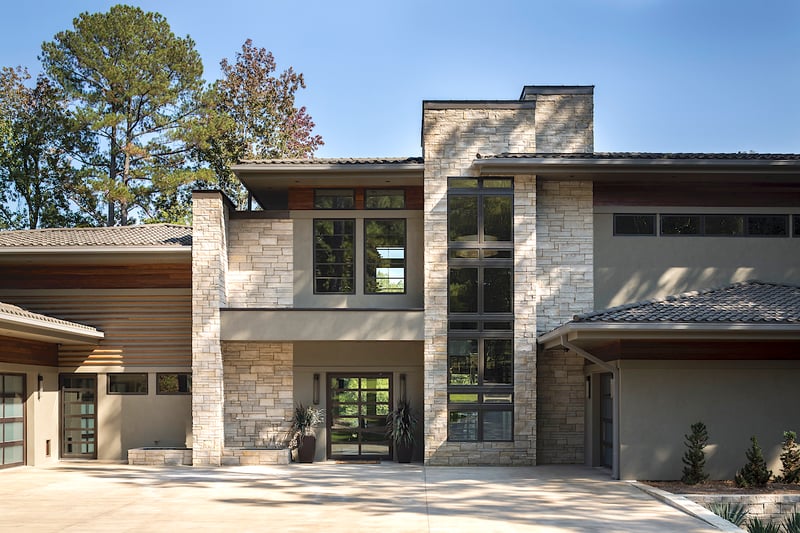
With full river views from every room, architect Phil Kean created multiple balconies in this southern home for private relaxing and several different patio areas using Indiana Limestone - Full Color Blend™. Kean created this double-sided fireplace feature, clad in Berkshire™ thin veneer as an anchor piece.
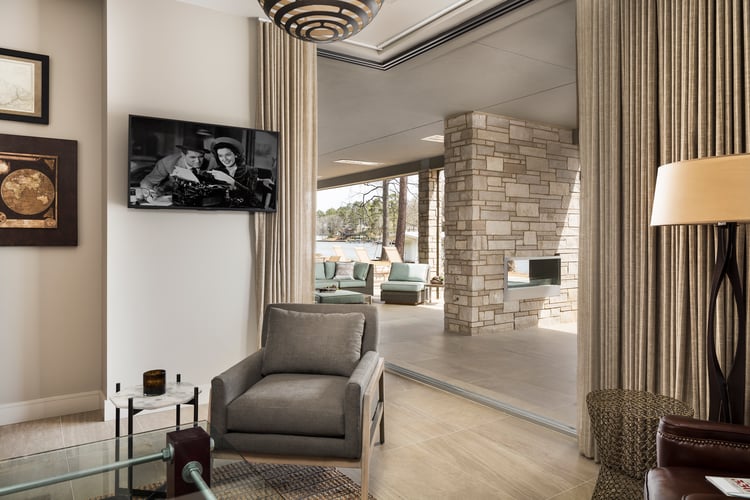
“I wanted to create a very vertical element against the very horizontal lines of the house," says Kean. "With Indiana limestone, you can dress it up or dress it down. Depending on how you finish it, it can be rustic or it can be classically tailored.”
![Fenton Michigan Lake House 15[Hardscapes_&_Masonry Indiana_Limestone_Full_Color_Blend™ Slabs_Pavers Smooth Landscape_Steps]](https://go.polycor.com/hs-fs/hubfs/Fenton%20Michigan%20Lake%20House%2015%5BHardscapes_%26_Masonry%20Indiana_Limestone_Full_Color_Blend%E2%84%A2%20Slabs_Pavers%20Smooth%20Landscape_Steps%5D.jpg?width=450&name=Fenton%20Michigan%20Lake%20House%2015%5BHardscapes_%26_Masonry%20Indiana_Limestone_Full_Color_Blend%E2%84%A2%20Slabs_Pavers%20Smooth%20Landscape_Steps%5D.jpg)
You don’t need a tent set up in the middle of the woods to enjoy a campfire. Recreating experiences spent in the great outdoors can be staged in a residential hardscape, especially when genuine natural stone is incorporated into that landscape. Airports, lines and other stressors that can come with travel lead some to prefer time spent home, but in spaces other than a living room or kitchen - we're looking at you, patio!
Through observing nature and taking in the colors, sounds and smells that it provides we can benefit from the healing qualities that come with open air relaxation spaces like stone backyards - known as biophilia in design. Neutral hues harmonize with nature, like Indiana Limestone paving, and blend with the surroundings. The exterior walls and door frames of homes are opening wider, incorporating more glass and are transitioning seamlessly with adjoining outdoor spaces for a seamless transition from indoors to out.
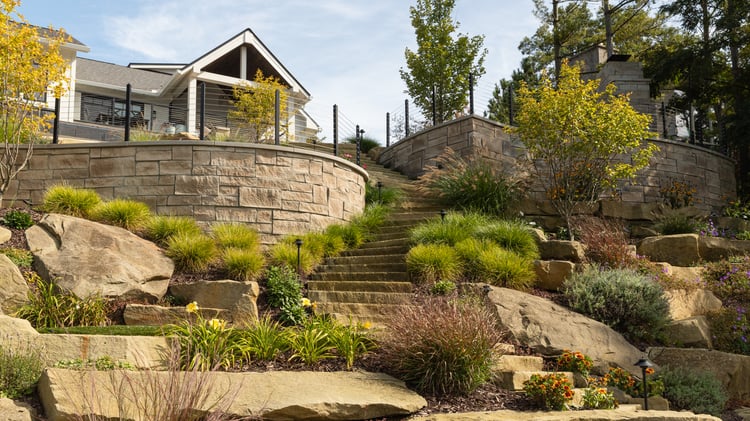
Natural boulders of Indiana Limestone were used to create various levels in this Midwest home. Other Indiana Limestone hardscaping elements were built into the landscape like steps, treads, pavers, coping and veneer to give the effect that it was carved out of the land itself.
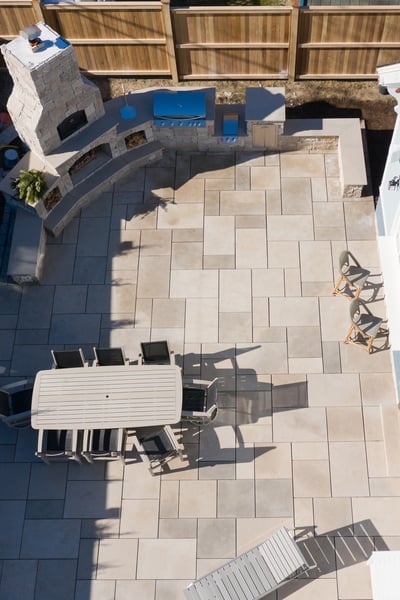 Built To Last
Built To LastWhen it comes to making upgrades and investing in home renovation projects, using natural stone protects your investment unlike any other building material can. No other product will outperform the competition time and again like genuine stone will. Just look at the centuries-old structures still standing today that look as beautiful as the day they were completed. According to Time Magazine's 2021 What Homeowners Want article, spending renovation resources on outdoor living spaces can make a significant difference for potential buyers.
“The top features home buyers want...are a quiet property or neighborhood, followed by more outdoor space, such as a yard or patio,” says Andrina Valdes, COO of Cornerstone Home Lending, Inc. in Texas.
Investing in an Indiana Limestone backyard project will provide unrivaled beauty and permanence while securing the initial investment.
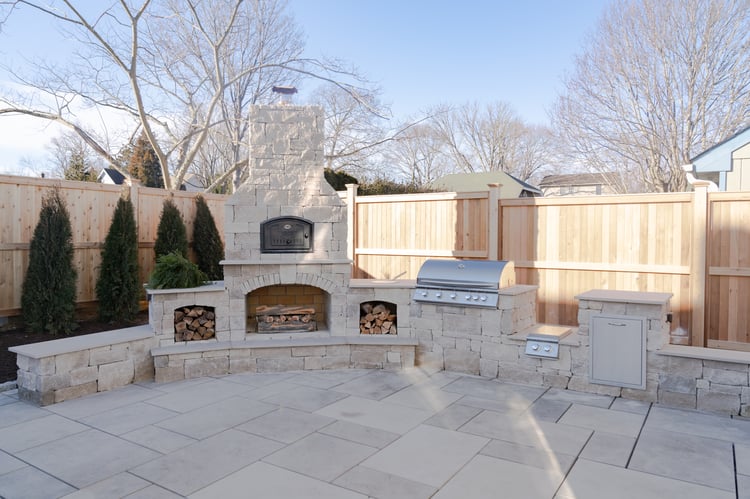
Pattern pavers, Rockford Estate Blend™ thin veneer and slab countertops all cut from Indiana Limestone - Full Color Blend™
The National Association of Realtors claims an outdoor kitchen project will recoup 71% of the initial investment. To guarantee the best ROI include features like an inset grill, stainless steel drawers, ice chest, and stone countertops.
Read more about how Indiana Limestone was used in this Naragansett, RI remodel featured on This Old House. Download the Ebook.
 Own A Piece of History in Your Own Backyard
Own A Piece of History in Your Own BackyardNatural stone simply adds a timeless, and authentic, elegance to projects that can stand up to fads and resist looking dated after a few years when new trends come and go (we’re looking at you, terracotta and Saltillo tiles). And because of its timelessness and durability, the value of Indiana Limestone far outweighs man-made materials — engineered products just can’t compete, like concrete pavers for example.
Polycor stones have been used in the construction of iconic architecture and monuments worldwide, including some of the most admired American buildings like the Empire State Building, clad in Indiana Limestone. Engineered materials simply lack that historical connection and authenticity.
Unlike man-made products that degrade and fade over time quarried stone can handle whatever mother nature throws its way (because it is mother nature). Free of added chemicals and dyes, what you see in Indiana Limestone is what was created by father time, geologic forces and millions of years of perfection.
%20(1).jpg?width=750&name=National%20Cathedral%20-%20Washington%2c%20DC%20-%20Indiana%20Limestone%20-%20Rustic%20Buff%20(3)%20(1).jpg)
National Cathedral, Washington, D.C. is built with solid blocks of Indiana Limestone and is entirely self-supporting. It requires no interior structural framework thanks to the strength and density of Indiana Limestone.
CHECK OUT MORE HISTORIC PROJECTS WHERE POLYCOR NATURAL STONES HAVE BEEN USED
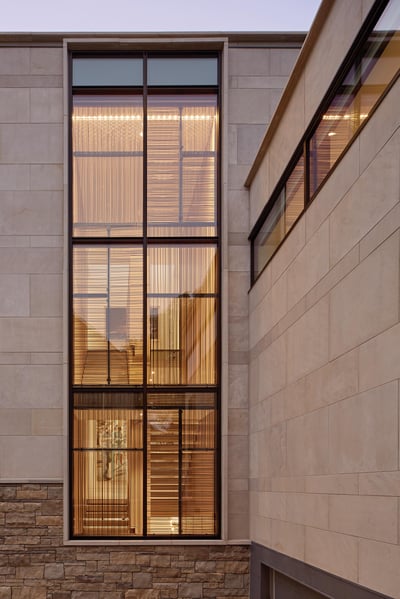
Another defining quality of Indiana Limestone is its versatility - not only in where and how it can be used but also the design styles it can compliment.
The clean lines and linear patterns provided by consistent stones like limestone lend themselves to the monolithic and uninterrupted expanses of contemporary architecture and modern homes. Incorporating different finishes to the stone, whether honed, thermal or split face, while keeping a monochromatic palette also help define sleek outdoor spaces.
Rustic farmhouses, colonials, and New England-style homes alike also share an equal affinity with Indiana Limestone's aesthetic qualities. The seaside Victorian home below blended seamlessly into the local vernacular, keeping a new addition in line with the historic district's building codes by highlighting the stone's harmonizing characteristics.
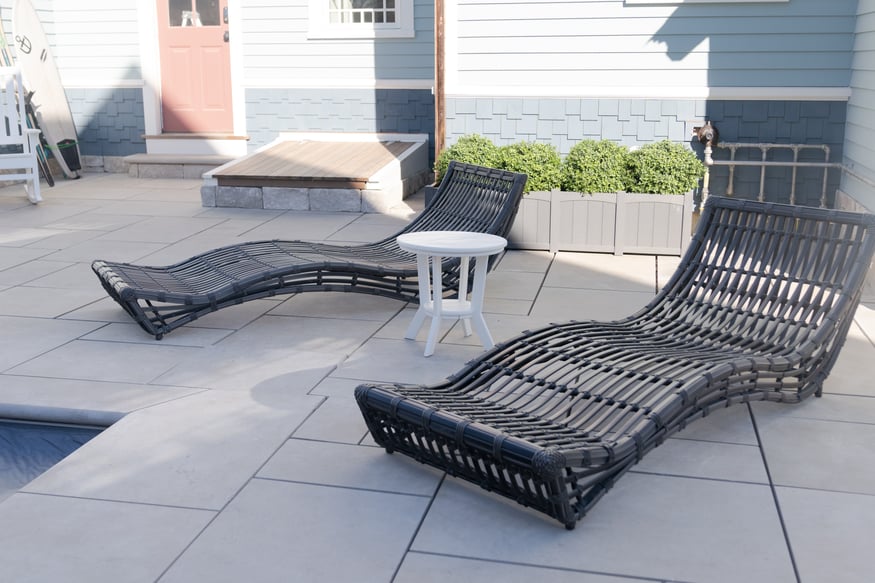
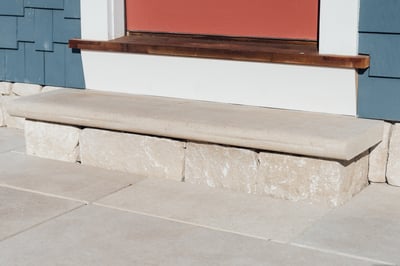
This outdoor living space had a large—and historically appropriate part—to play in the renovation. By using Indiana Limestone, the builder and designer were able to modernize the outdoor spaces with slab pavers, veneers and limestone steps while still maintaining the charm and history of the home.
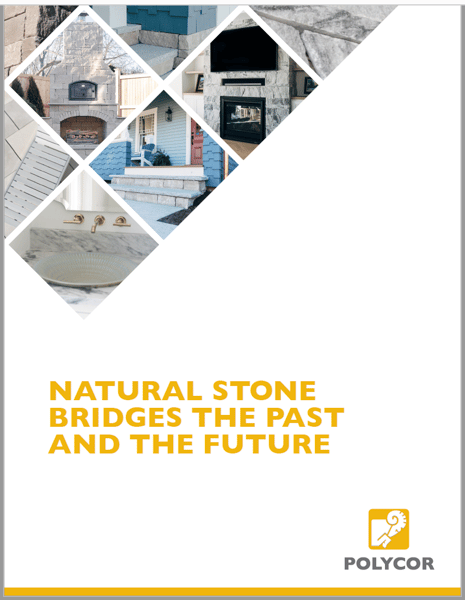
Watch the video below to see how the stone was integrated into the design
"The INDIANA LIMESTONE - FULL COLOR BLEND™ in the back patio complimented the two blue tones that we used on the house, which were inspired by its proximity to the ocean." Kristen Martone, Sweenor Builders
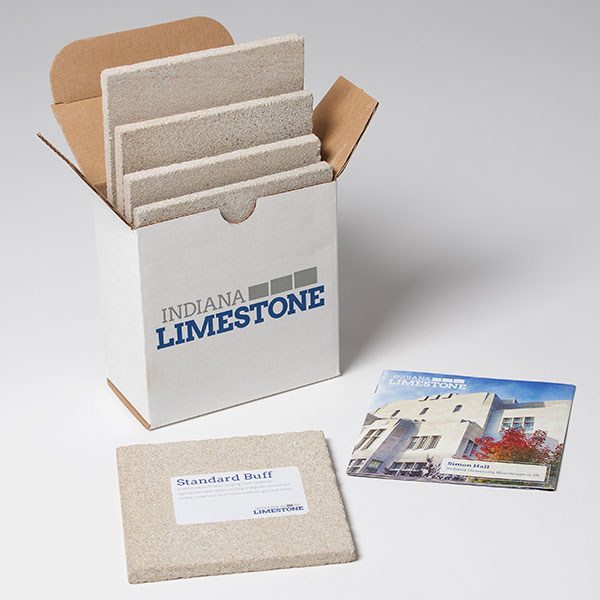
While natural stone intrinsically meets the same needs indoors and out, other materials need to work harder to create the comfort and style homeowners crave in both locations. And people are looking for more updated and upgraded materials that bridge the divide between their homes and their backyard, porch, or patio.
I think that is a tremendous advantage for a product like natural stone. If you're already using it for your patio and siding on your home, why not use it inside? That blend, that continuity of product makes so much sense when you're trying to blur the line between the inside and outside, to use the same material across both. And only a natural product can truly bring that seamless connection with nature.
Natural. Touchable. Timeless. Indiana Limestone is known for its durability, texture and aesthetic appeal in commercial, institutional and residential projects.
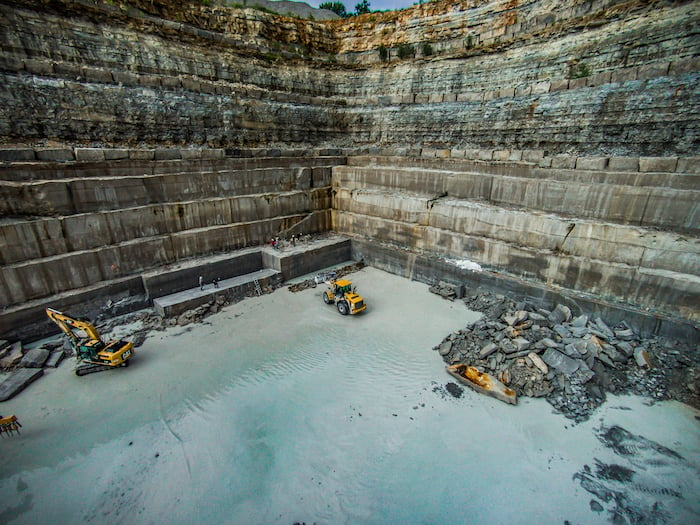
Indiana Limestone is already made for us and doesn't require any additions of colorants, chemicals or additives to make it what it is. Simply sawing the dimensional blocks into incrementally smaller pieces to predetermined specs for the application, and smoothing their surfaces with abrasives, is all it takes to get to the finished product. It's essentially finished for us beforehand, we just need to "reveal" its inherent nature for all to admire.
Indiana Limestone is virtually unlimited in the miles-long deposits, with geologists estimating over 1,000 years of reserves, based on current extraction methods above and below ground. The reserves are vast, but the consistency of the stone is just as important. Whether a project is large and will require several truckloads of stone or if a building addition requires new stone to match up to old stone, the grade and color selected will remain within range. This is not true for some other natural building stones.
Traditional buff color ranging from cream to light brown with some veining and grain movement visible in the face and fine to medium grained stone
![Standard Buff[Indiana_Limestone_Standard_Buff™ Grades_Colors]](https://go.polycor.com/hs-fs/hubfs/This%20Old%20House/Hardscapes%20Pillar%20Page%202021/Standard%20Buff%5BIndiana_Limestone_Standard_Buff%E2%84%A2%20Grades_Colors%5D.jpg?width=450&name=Standard%20Buff%5BIndiana_Limestone_Standard_Buff%E2%84%A2%20Grades_Colors%5D.jpg)
Clean buff color with subtle silver colored veining in the foreground and fine to medium grained stone
![Silver Buff[Indiana_Limestone_Standard_Silver_Buff™ Grades_Colors]](https://go.polycor.com/hs-fs/hubfs/This%20Old%20House/Hardscapes%20Pillar%20Page%202021/Silver%20Buff%5BIndiana_Limestone_Standard_Silver_Buff%E2%84%A2%20Grades_Colors%5D.jpg?width=450&name=Silver%20Buff%5BIndiana_Limestone_Standard_Silver_Buff%E2%84%A2%20Grades_Colors%5D.jpg)
Traditional buff color ranging from cream to light brown with visible veining in the face and medium to coarse grained stone
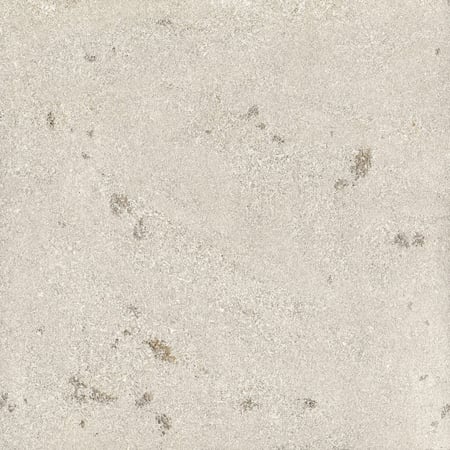
Light to medium shades of gray with some veining and grain movement visible in the face and fine to medium grained stone
![Standard Gray[Indiana_Limestone_Standard_Gray™ Grades_Colors]](https://go.polycor.com/hs-fs/hubfs/This%20Old%20House/Hardscapes%20Pillar%20Page%202021/Standard%20Gray%5BIndiana_Limestone_Standard_Gray%E2%84%A2%20Grades_Colors%5D.jpg?width=450&name=Standard%20Gray%5BIndiana_Limestone_Standard_Gray%E2%84%A2%20Grades_Colors%5D.jpg)
A natural compilation of the full range of buff to medium gray shades with the same great subtle veining
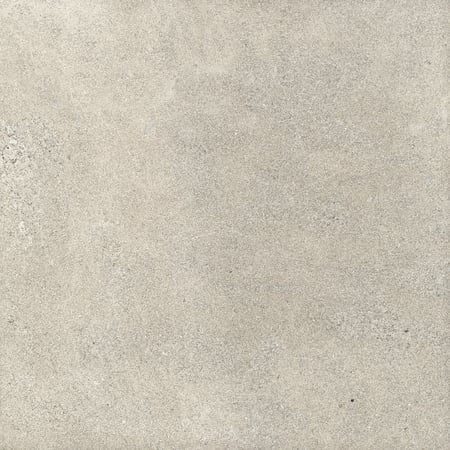
A medium to large grained limestone keeping within a gray tonal range of light to medium gray shades that exhibits unique features and fossilized inclusions for a neutral, subtly veined, and rustic aesthetic.
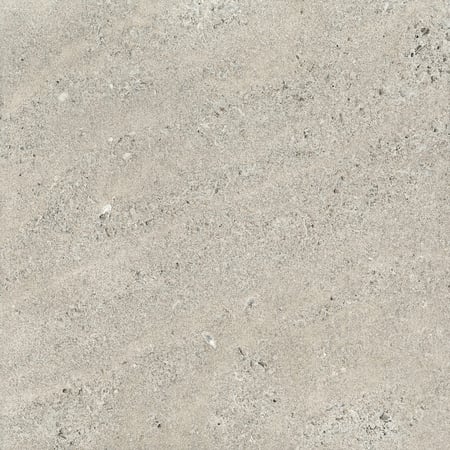
Available in colors and grades from buffs to grays to full color blend, Polycor's vast resources and reserves of Indiana Limestone mean options to match most every project need. We offer architects, builders, and fabricators a versatility that is unmatched by any other supplier of limestone.
Forever Timeless, Built To Last
 "Limestone is far more beautiful than any other stone ... it reflects the light beautifully and even on a gray day it seems to glow."
"Limestone is far more beautiful than any other stone ... it reflects the light beautifully and even on a gray day it seems to glow."
- Robert A.M. Stern, RAMSA

Iconic architecture on the streets of New York, like the Flatiron Building, are constructed with Indiana Limestone
The lobbies of New York’s most exciting new buildings and their wall cladding are dressed in Indiana Limestone, the same stone used to build New York in its Golden Age.
Whether walking by one of these iconic buildings, or entering into one of their grand lobbies, you feel transported in time, yet still rooted in the exciting energy of present-day New York.
That’s in large part thanks to the use of prestigious Indiana Limestone, which helped build New York landmarks such as the Empire State Building, Metropolitan Museum of Art, Grand Central Station and Rockafeller Center. It’s a stone that has stood the test of time, like the iconic buildings that are shorthand for New York’s Golden Age of architecture.
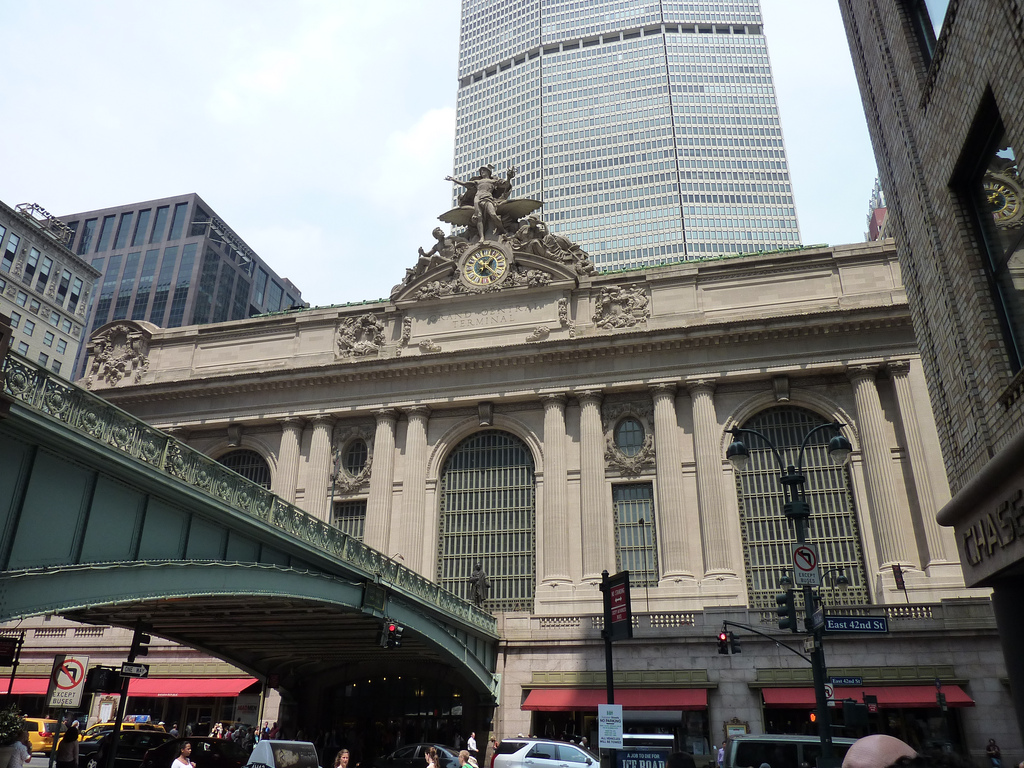 Grand Central Terminal, New York, NY clad in Indiana Limestone
Grand Central Terminal, New York, NY clad in Indiana Limestone
Despite its historical significance, architects aren’t restrained by the past. They are using Indiana Limestone on new builds in a fascinating, dynamic conversation between time-honored design and cutting-edge techniques.
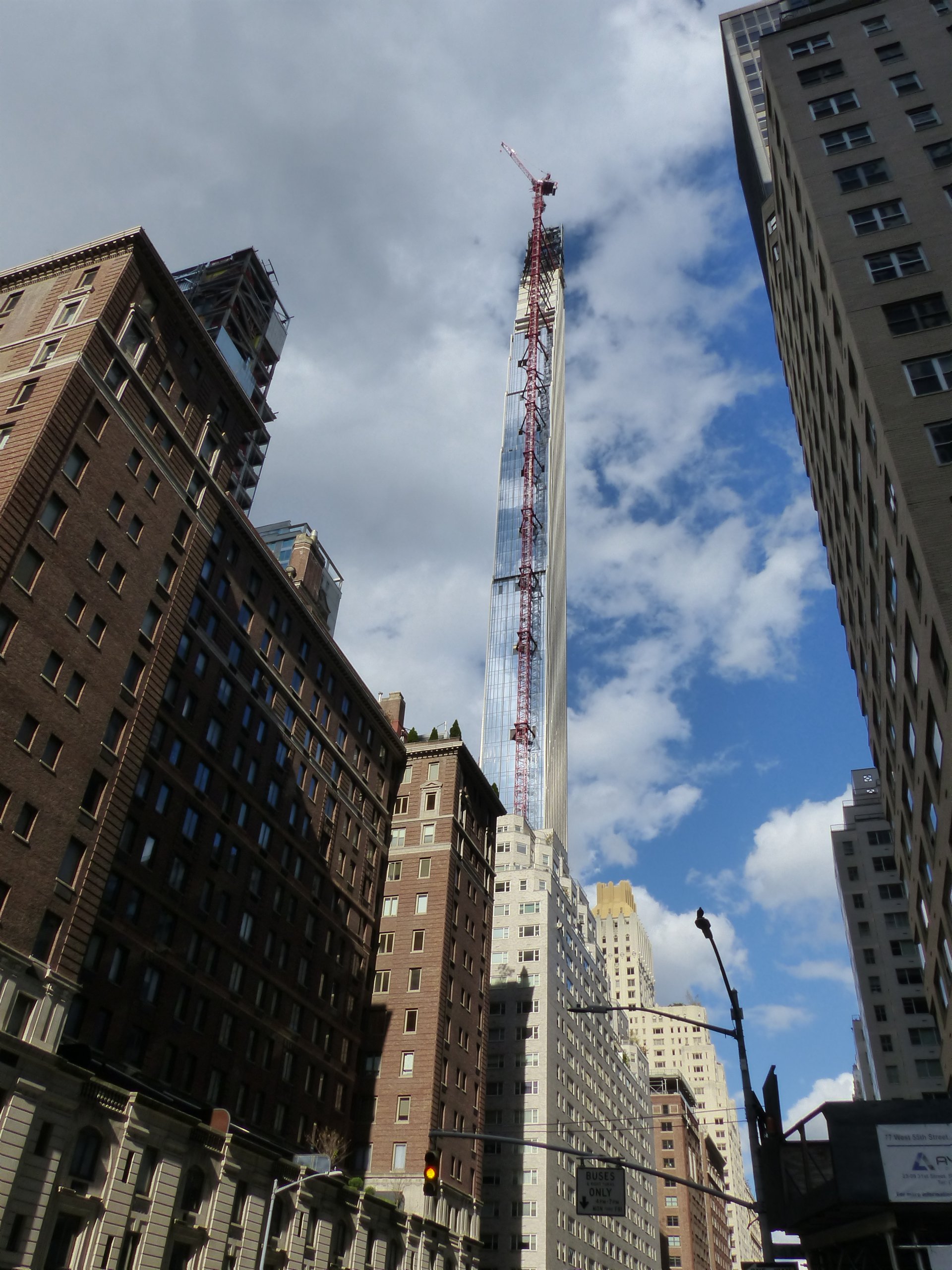
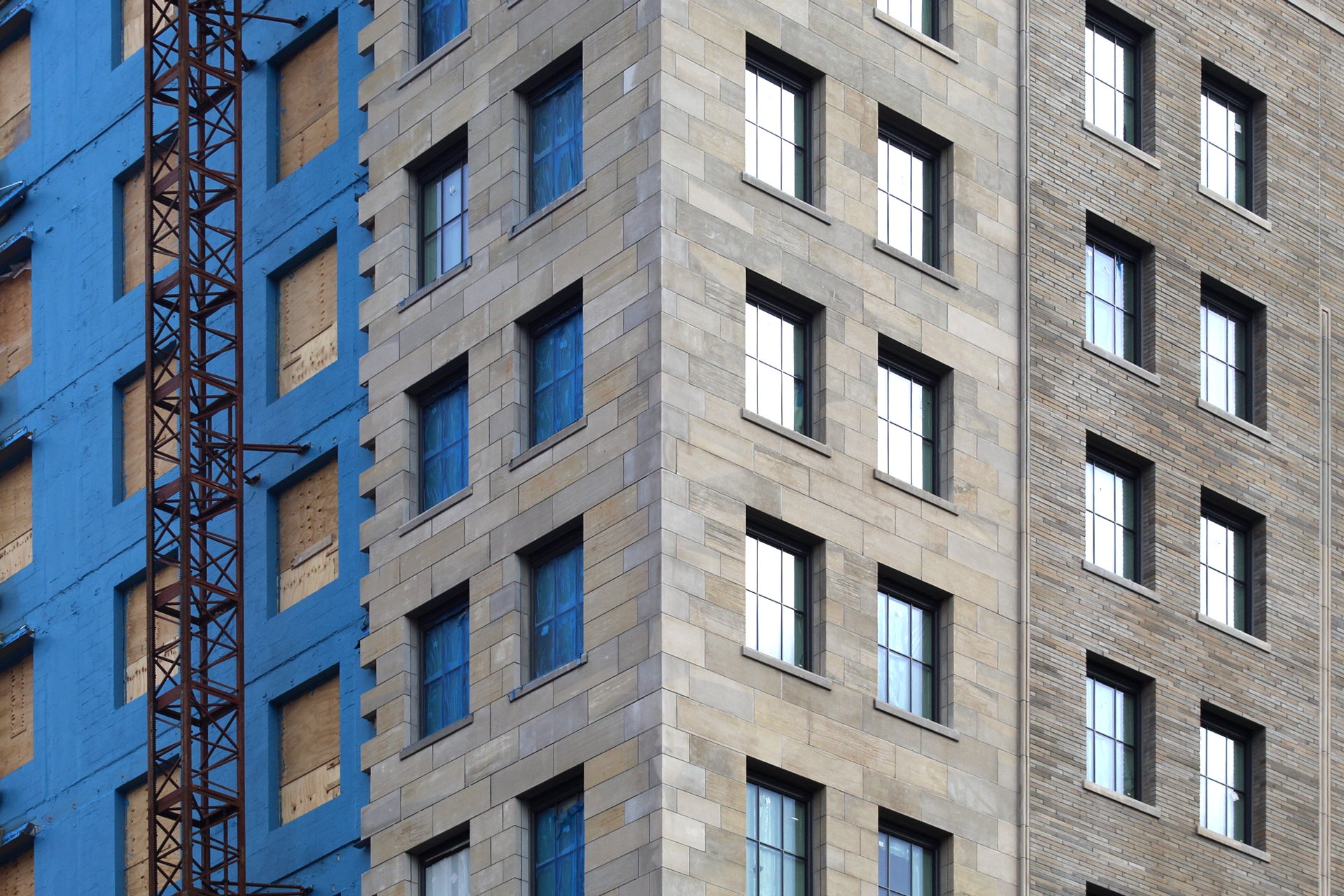
-1.jpg?width=200&name=Tribune%20Tower%20-%20Chicago%2c%20IL%20-%20Indiana%20Limestone%20(1)-1.jpg) What does it take to create a monumental tradition of building excellence? In part, it’s an unshakable foundation of superlative stone products – the remarkable strength, beauty and permanence only genuine Indiana limestone provides. It’s also the gift of generations of skilled quarrymen, finishers and the management and teams supporting them.
What does it take to create a monumental tradition of building excellence? In part, it’s an unshakable foundation of superlative stone products – the remarkable strength, beauty and permanence only genuine Indiana limestone provides. It’s also the gift of generations of skilled quarrymen, finishers and the management and teams supporting them.
Perhaps most of all, it’s the recognition of the architectural community and the markets it serves that this stone is without equal in bringing distinguished building design to dazzling life.
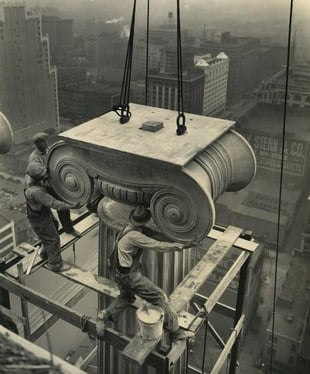 The record speaks for itself. Thirty-five state capitols are built of our Indiana limestone. The Indiana State War Memorial and the University of Illinois Monument display it unforgettably. So does Biltmore, the fabulous Vanderbilt mansion in North Carolina. So do the Pentagon and Yankee Stadium.
The record speaks for itself. Thirty-five state capitols are built of our Indiana limestone. The Indiana State War Memorial and the University of Illinois Monument display it unforgettably. So does Biltmore, the fabulous Vanderbilt mansion in North Carolina. So do the Pentagon and Yankee Stadium.
Icon after revered icon, across the North American continent – as well as great contemporary buildings like Manhattan’s prize-winning 15 Central Park West multi-unit residential structure. Indiana limestone is the native material of masterpiece American architecture, and it’s at the disposal of today’s great designers to build the classics to come.
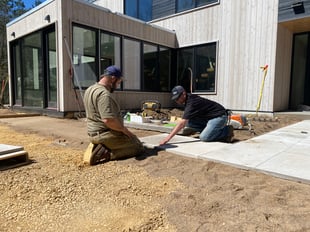 Pavers. Indiana Limestone pavers are a go-to choice for homeowners and contractors looking for a light-toned, neutral paver that has character and is backed by a proven track record of performance. Having been used for well over a century in a variety of design styles, Indiana Limestone is a timeless stone that will never go out of style, regardless of trends that come and go. The warm color and inviting texture, coupled with the fact that it stays cool underfoot in the hot sun, make it a popular paving stone that pairs well with just about any palette or mix of patterns and materials.
Pavers. Indiana Limestone pavers are a go-to choice for homeowners and contractors looking for a light-toned, neutral paver that has character and is backed by a proven track record of performance. Having been used for well over a century in a variety of design styles, Indiana Limestone is a timeless stone that will never go out of style, regardless of trends that come and go. The warm color and inviting texture, coupled with the fact that it stays cool underfoot in the hot sun, make it a popular paving stone that pairs well with just about any palette or mix of patterns and materials.
Indiana limestone pavers can be installed over many different substrates including crushed aggregate and concrete slabs, the most common of which is an open-graded base. Compared to densely graded bases, open-graded bases create greater permeability and assist with water management, directing rainwater down into the subsoil. A combination of 3/4" washed stone aggregate and 3/8" clean, angular stone, one layered on top of the other, provides a stable and sturdy foundation on which to install Indiana Limestone pavers. This system also eliminates trapped moisture that often occurs when setting pavers into a sand bed.
LEARN MORE ABOUT INSTALLING PAVERS AT POLYCOR U
Paver Patterns
Indiana Limestone is available in a wide array of paver patterns. From 3-piece slab paver patterns, to 4 piece paver patterns, there's a large selection of sizes that can be mixed and matched together to create unlimited design option. Depending on the design intent, the paver patterns can be more modern by utilizing a limited range of large sizes, such as with these XL pavers, or a more formal appearance by using a large mix of sizes for a traditional, French Versailles pattern.
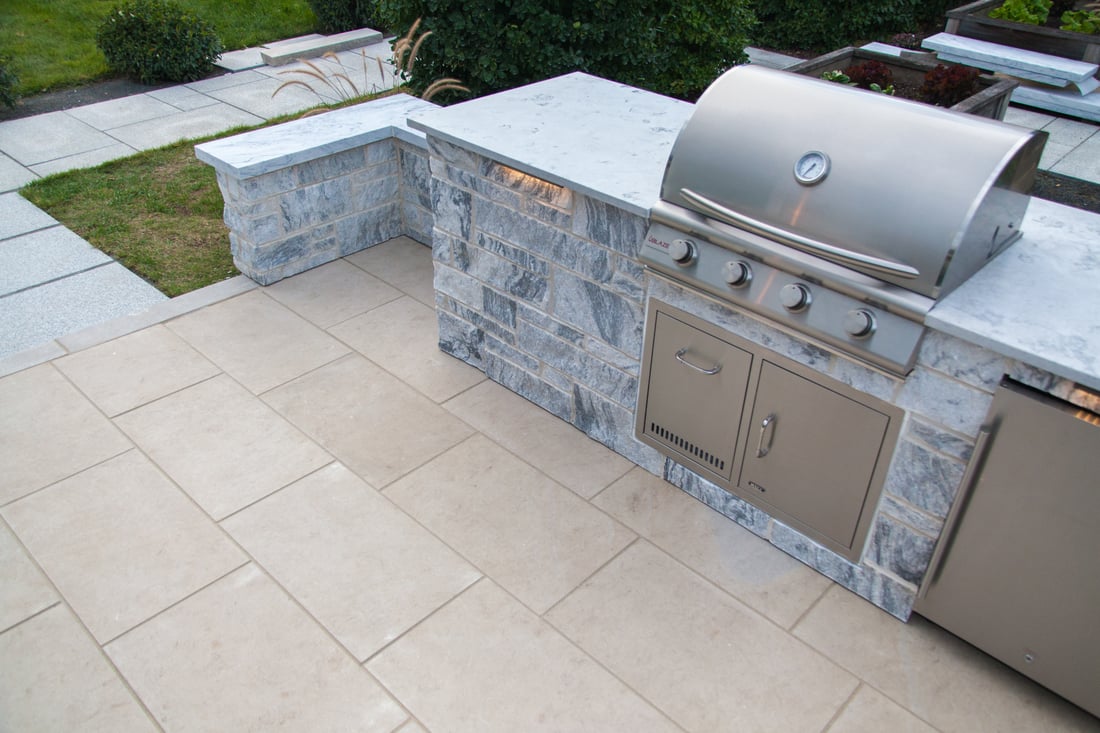
SEE ALL INDIANA LIMESTONE PAVER PATTERNS AVAILABLE FROM POLYCOR
.jpg?width=1100&height=799&name=Shadowlight_HM%20(10).jpg)
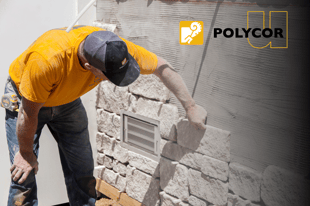
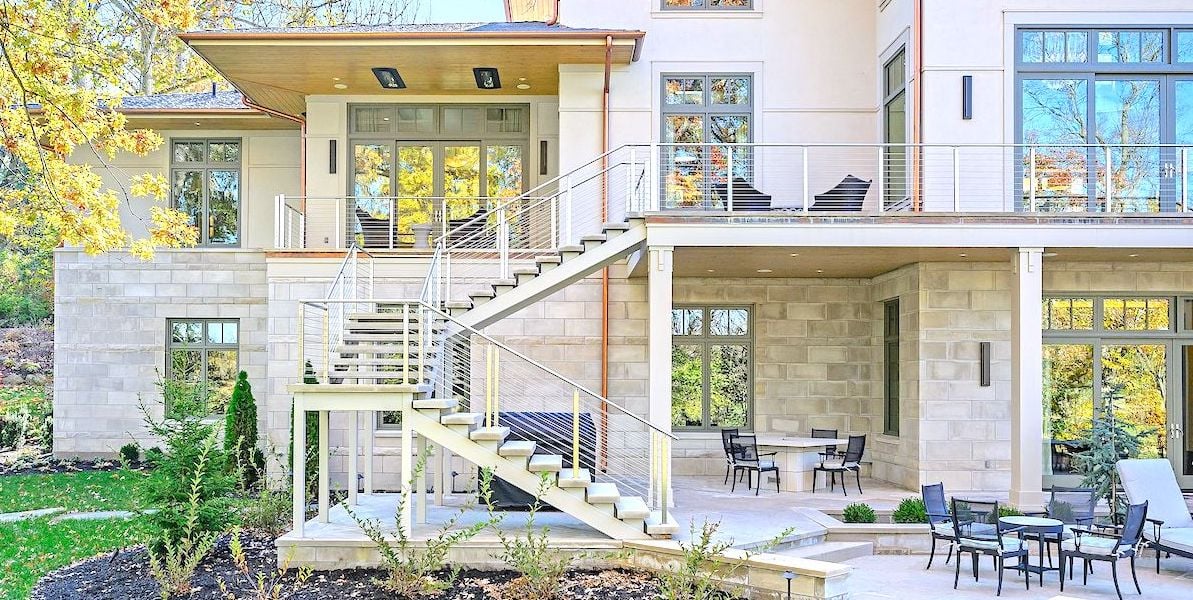
Water management is vital when installing stone veneer on a home exterior. A drainage plane and a weep screed between the lath and waterproofing work together to serve as a vent allowing the water to drain freely behind the wall and facilitate airflow.
Watch this short video on how to install Indiana Limestone - Full Color Blend™ Rockford veneer. Or watch the full-length version here.
A drainage layer is key to getting moisture out and keeping it out — just remember to keep 'drain on the brain'! A minimum of 3/16" gap (3/8" in Canada) will allow space for air to flow and vapors to hit the wall, drop down and evaporate.
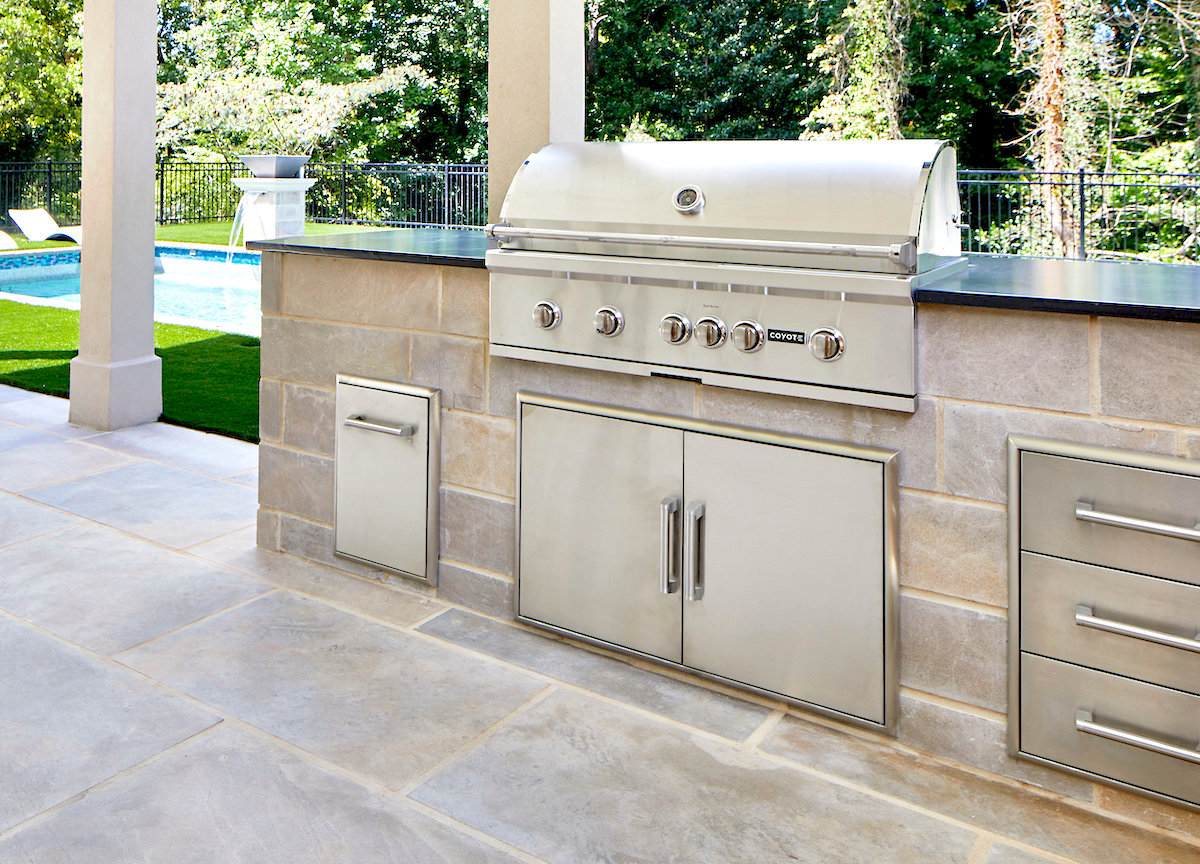 Outdoor kitchens are ideal spaces to install Indiana Limestone veneer. They resist the damaging effects of the weather and freeze / thaw cycles while also maintaining their aesthetic appeal.
Outdoor kitchens are ideal spaces to install Indiana Limestone veneer. They resist the damaging effects of the weather and freeze / thaw cycles while also maintaining their aesthetic appeal.
Polymer-modified mortars are the preferred choice of setting material for adhered veneers. They are low in alkalis and have the strongest bonds, as well as flexibility that allow it to move as the structure moves in varying weather and climate conditions.
SEE MORE ON HOW TO INSTALL INDIANA LIMESTONE THIN VENEER
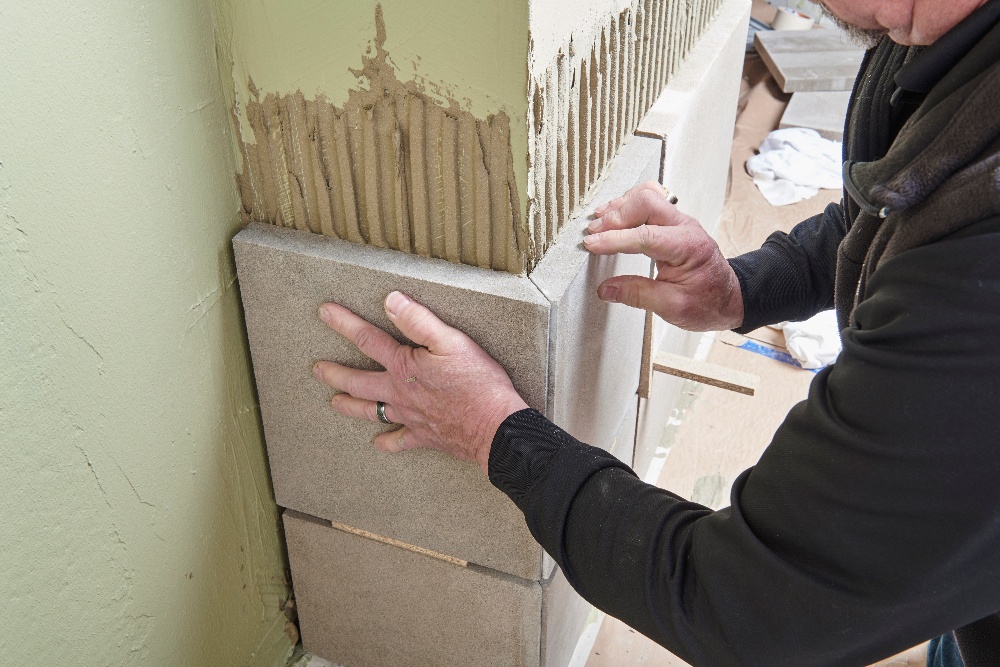
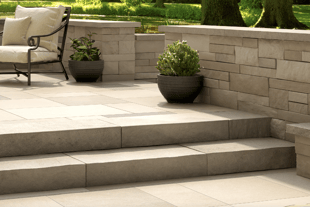 Steps. Landscape steps and step treads receive a lot of foot traffic and need to withstand the elements in addition to the abuse that dirty boots and shoes can shell out. That's why Indiana Limestone steps and treads have been a staple in hardscape dealer yards for years. Contractors have come to rely on their resilience and to depend on them for their client's needs when it comes to a set of steps that must be built to last.
Steps. Landscape steps and step treads receive a lot of foot traffic and need to withstand the elements in addition to the abuse that dirty boots and shoes can shell out. That's why Indiana Limestone steps and treads have been a staple in hardscape dealer yards for years. Contractors have come to rely on their resilience and to depend on them for their client's needs when it comes to a set of steps that must be built to last.
Installing step treads is generally done with mortars on concrete block foundations whereas landscape steps, cut from solid blocks of Indiana Limestone, can be dry set onto crushed aggregate bases. Tread stock is sometimes used as coping material as well for perimeters around raised patio areas and for wall cap material. In this application the stone is wet set into mortar beds as well.
![Residence Landscape - Unknown - Indiana Limestone - Pavers & Pool Coping (4)[Indiana_Limestone_Standard_Gray™ Treads]](https://go.polycor.com/hs-fs/hubfs/h%20and%20m%20July%202022/Residence%20Landscape%20-%20Unknown%20-%20Indiana%20Limestone%20-%20Pavers%20%26%20Pool%20Coping%20(4)%5BIndiana_Limestone_Standard_Gray%E2%84%A2%20Treads%5D.jpg?width=786&height=590&name=Residence%20Landscape%20-%20Unknown%20-%20Indiana%20Limestone%20-%20Pavers%20%26%20Pool%20Coping%20(4)%5BIndiana_Limestone_Standard_Gray%E2%84%A2%20Treads%5D.jpg)
WATCH THIS VIDEO ON HOW TO INSTALL LANDSCAPE STEPS
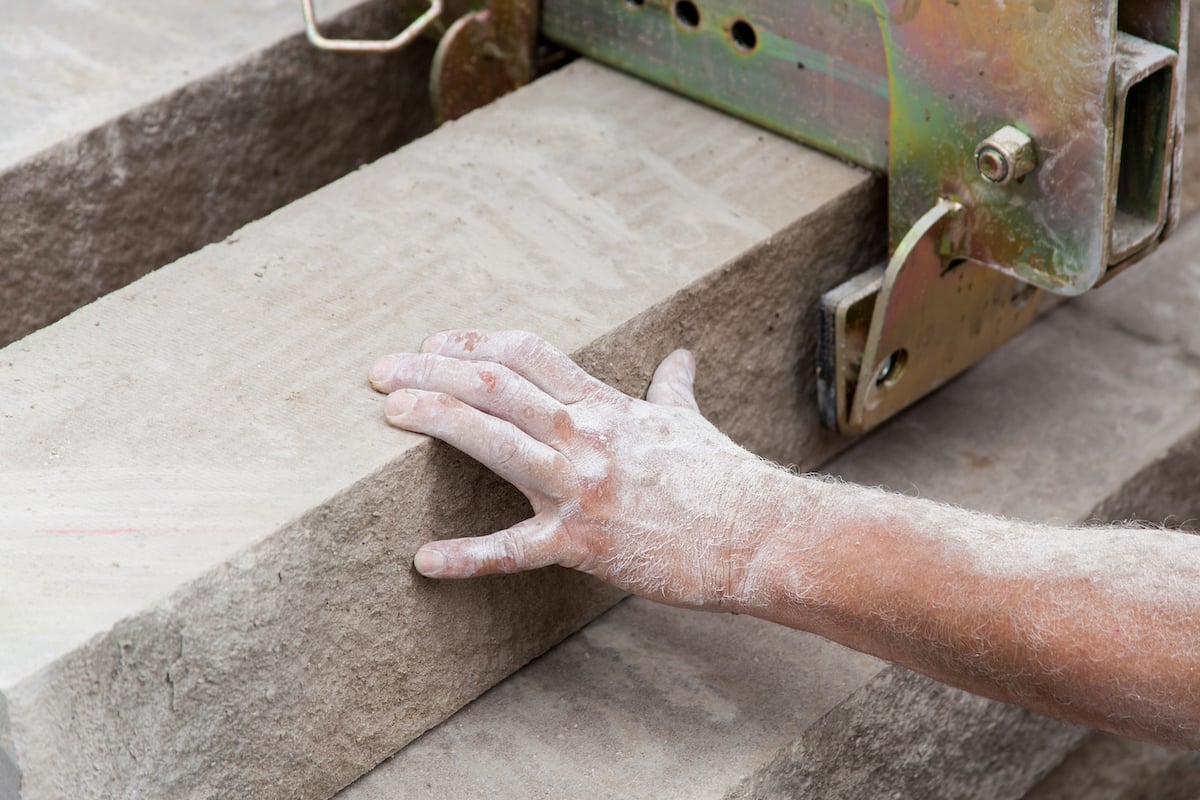
How extensive are Indiana Limestone Company’s reserves?
Indiana Limestone is virtually unlimited, with geologists estimating 500-600 years of reserves, based on current extraction methods. The reserves are vast, but the consistency of the stone is just as important. Whether a project is large and will require several truckloads of stone or if an addition requires new stone to match up to old stone, the grade and color selected will remain within range. This is not true for some other natural building stones.
What colors are available for Indiana Limestone blocks and slabs?
Indiana Limestone blocks and slabs are available in a full range of naturally beautiful colors, including standard buff, rustic buff, silver buff gray, and full color blend.
What Indiana Limestone grades are available?
Indiana Limestone Company offers select, standard, rustic, and old gothic grading. The structural soundness of each of the grades is essentially identical.
What is the weight of Indiana Limestone?
Indiana Limestone weighs 144 lb./per cubic ft.
What is the compressive strength of Indiana Limestone?
The compressive strength is 4,000 PSI minimum (ASTM C170).
What is the moisture absorption of Indiana Limestone?
Limestone is typically put into three levels of density. Indiana Limestone Company has a minimum 7 1/2% moisture absorption rate, which classifies it as a medium density stone. Currently, Indiana Limestone products are running at around 4%, which means it has higher density.
How should you clean Indiana Limestone products?
The most successful method is pressure cleaning at no more than 1,200 psi. Keep the nozzle a minimum of 1' away and use a fan tip nozzle approximately 12" wide.
Should you dampproof Indiana Limestone?
Dampproofing should be applied on all unexposed areas at grade up to 12". Below grade total stone must be dampproofed. An ideal dampproofing material resists both positive and negative hydrostatic pressure.
Our most recent paver testing was completed using BASF Masterseal 581 applied in two coats and mixed according to manufacturer specifications with MasterEmacco A 660.
Does Indiana Limestone need to be sealed?
While it isn't generally recommend to seal Indiana Limestone because of the potential for discoloration from its original buff and grey shades, it is best to consult with your engineer to determine if sealing is appropriate based on the final application of the stone.
What types of anchors should be used for Indiana Limestone products?
All anchors should be stainless steel or other non-corrosive. Consult your engineer for anchor type guidance.
What selection size do you offer for panels?
For most purposes, 3" or thicker. 2" needs to have special design considerations for the anchoring systems. Polycor has the abailty to manufacture panels to a variety of thicknesses, even as thin as 3/8" for use with lightweight aluminum honeycomb-backed panel systems such as Litecore.
What is the SRI (solar reflective index) of Indiana Limestone?
SRI measures the ability of a constructed surface to reflect solar heat. Designing with high-SRI materials like Indiana Limestone products is important because it can reduce the “heat island effect” commonly associated with urban areas. Indiana Limestone’s SRI ratings make it eligible for LEED 2009 and LEED v4 SRI related points for non-roof applications.
Can Indiana Limestone be load-bearing?
Yes, as solid columns, self-supporting headers, etc.
There are many sustainable practices that manufacturers of building materials can adopt, but there is only one building material that is inherently good for the earth and good for your health: natural stone.
Natural stone takes less water to process, doesn’t release VOCs and lasts longer than concrete, glass or quartz. And projects that use natural stone require less maintenance.
Natural stone requires no chemicals for production. In fact, “production” for natural stone means extraction, cutting and polishing. Contrast that with other building materials like cast concrete surfaces, which use a combination of crushed stone and portland cement to manufacture products, that have large carbon footprints due to the need to burn limestone to produce the cement.
Natural stone produces minimal excess material and is highly recyclable. At Polycor excess stone is processed into gravel for roads, curbs, landscaping products, and even furniture and jewelry. At the Polycor Tate, Georgia marble quarry (a zero waste quarry) even the stone dust is recycled into powder for additives into plaster and cement to lighten its color. The natural stone extraction process has high yields and little excess material because the stone is close to surface. Different from mining, where large amounts of earth must be removed to extract, for example, coal.
Polycor natural stone products are virtually maintenance-free and when properly maintained, will provide long-term performance for generations to come, Indiana Limestone included.